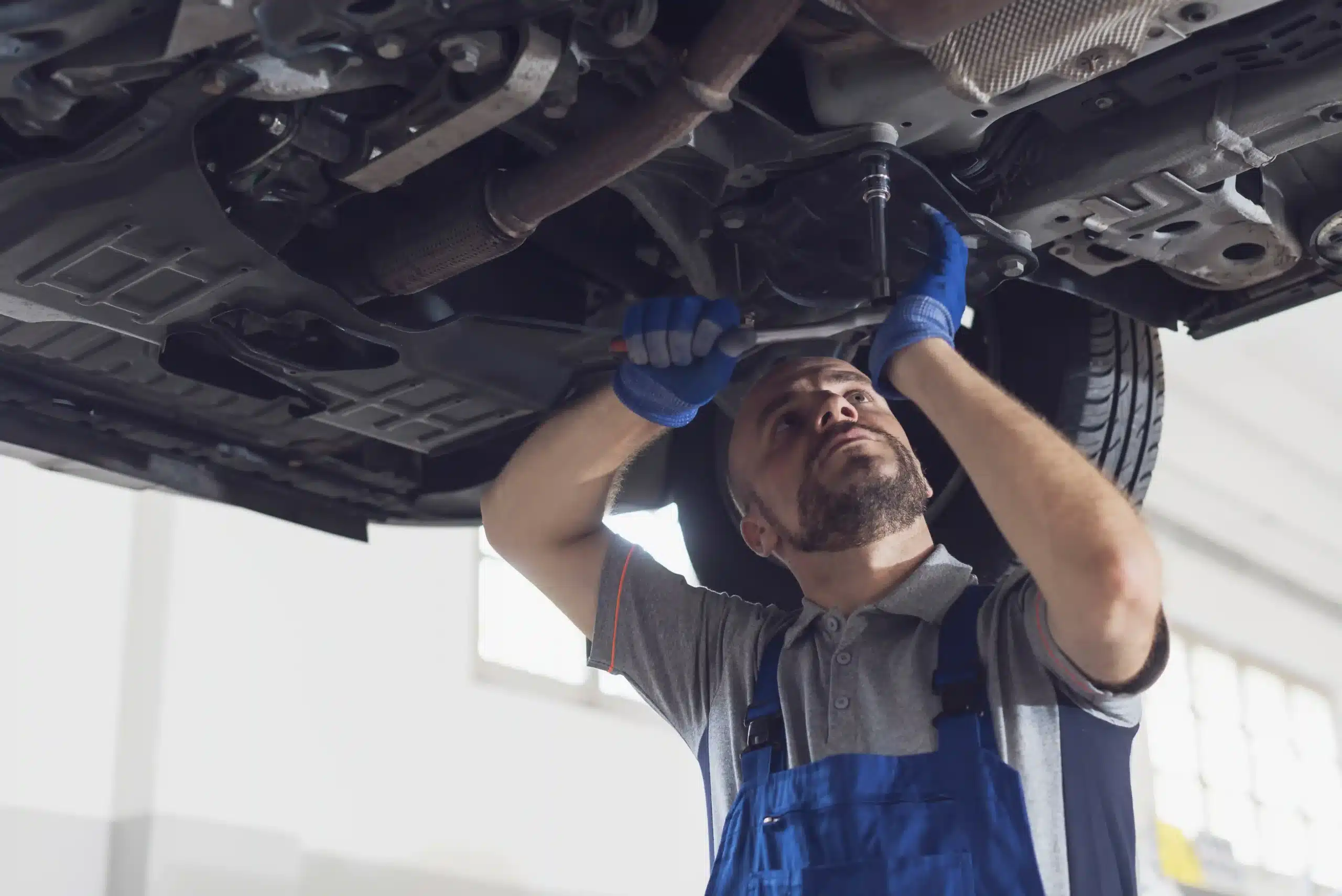Got a P0299 fault code showing up on your car? Don’t worry – it’s more common than you might think. At First Auto Centre, we see this code quite often, especially on turbocharged cars. The good news is that it’s usually fixable without costing you a fortune.
What Does P0299 Mean?
The P0299 code means “Turbocharger/Supercharger A Underboost Condition”. In simple terms, your turbocharger isn’t making enough boost pressure.
Think of your turbo like a bike pump. When you pump air into a tyre, you want good pressure. If your pump isn’t working properly, you won’t get enough pressure. That’s what’s happening with your turbo – it’s not pumping enough air into your engine.
Your car’s computer expects a certain amount of boost pressure. When it doesn’t get what it wants, it throws up the P0299 code and turns on your check engine light.
How Turbos Work (The Simple Version)
Before we talk about what goes wrong, let’s quickly explain how turbos work. Your turbo is basically two fans connected by a shaft. Exhaust gases spin one fan, which spins the other fan that pushes extra air into your engine. More air means more power.
When everything works properly, your turbo helps your engine make more power from the same-sized engine. But when something goes wrong, you get codes like P0299.
What Causes P0299?
There are several reasons why your car might show a P0299 code. Here are the most common ones we fix:
Boost Leaks This is the biggest cause. Air leaks anywhere in your turbo system mean less pressure gets to your engine. Common leak spots include:
- Split or loose intercooler hoses
- Cracked intercooler
- Loose clamps on turbo pipes
- Damaged intake pipes
Dirty or Blocked Air Filter Your turbo needs clean air to work properly. A dirty air filter makes your turbo work harder and can cause underboost problems.
Faulty Wastegate The wastegate controls how much boost your turbo makes. If it’s stuck open or not working right, you won’t get enough boost pressure.
Turbo Problems Sometimes the turbo itself has issues:
- Worn turbo bearings
- Damaged turbo blades
- Oil starvation damage
- Carbon build-up
Blocked Exhaust If your exhaust is blocked, the gases can’t spin the turbo properly. This can be caused by:
- Blocked DPF (diesel particulate filter)
- Damaged catalytic converter
- Blocked exhaust pipe
Sensor Problems Faulty sensors can give wrong readings to your car’s computer:
- MAP sensor (measures boost pressure)
- MAF sensor (measures air flow)
- Boost pressure sensor
Vacuum System Issues Many turbos use vacuum to control the wastegate. Vacuum leaks or faulty vacuum pumps can cause P0299.
If This Sounds Like Your Issue, Schedule a Diagnostic Now!
Signs You Might Notice
Apart from the check engine light, you might experience:
- Less power than usual
- Engine feels sluggish
- Poor acceleration
- Black smoke from exhaust (diesel cars)
- Whistling or unusual noises from the engine bay
- Poor fuel economy
- Car goes into “limp mode” (reduced power)
Some cars run fairly normally with P0299, but you’ll notice the lack of power, especially when overtaking or going uphill.
Cars That Get P0299 Most Often
We see P0299 codes on many different makes and models, but some are more common:
Volkswagen Group Cars
- Audi A3, A4, Q5
- VW Golf, Passat, Tiguan
- SEAT Leon, Ibiza
- Skoda Octavia, Superb
Ford Models
- Focus, Fiesta (EcoBoost engines)
- Mondeo, Kuga
BMW
- 1 Series, 3 Series (especially diesels)
- X3, X5
Vauxhall
- Insignia, Astra (turbo models)
- Mokka, Grandland
This doesn’t mean these cars are bad – they just have turbos, and turbos can develop problems as they get older.
How We Find the Problem
At First Auto Centre, we don’t guess. We test everything properly:
Check All Codes We look at all the fault codes, not just P0299. Other codes often give us clues about what’s really wrong.
Visual Check We look for obvious problems like split hoses, loose clamps, or damaged parts.
Boost Leak Test We pressurise your turbo system to find any leaks. Even small leaks can cause big problems.
Check Air Filter We check if your air filter needs changing. It’s a simple fix that sometimes sorts the problem.
Test Sensors We test all the sensors that tell your computer about boost pressure and air flow.
Check Turbo Operation We test if your turbo is actually working and making the right amount of boost.
Examine Exhaust System We check for blockages that might stop your turbo from working properly.
This step-by-step approach helps us find the real problem quickly.
Common Fixes for P0299
The fix depends on what we find:
Fix Boost Leaks New hoses, clamps, or intercooler repairs. This is often the cheapest fix and solves many P0299 codes.
Replace Air Filter A new air filter costs very little and can make a big difference.
Clean or Replace Sensors Sometimes sensors just need cleaning. If they’re faulty, we replace them.
Repair or Replace Turbo If your turbo is damaged, we can sometimes repair it. If not, we’ll fit a replacement.
Fix Wastegate Problems We can often fix wastegate issues without replacing the whole turbo.
Clear Exhaust Blockages DPF cleaning or catalytic converter replacement if needed.
Fix Vacuum Leaks Replace vacuum hoses or repair the vacuum pump.
Preventing P0299 Problems
You can help prevent this code by:
Regular Servicing Keep up with your car’s service schedule, especially oil changes. Turbos need clean oil to survive.
Change Air Filter Regularly Don’t let your air filter get too dirty. It’s cheap insurance for your turbo.
Let Your Engine Cool Down After a long drive, let your engine idle for a minute before switching off. This lets the turbo cool down properly.
Use Good Quality Oil Turbos get very hot and need good oil. Don’t skimp on oil quality.
Don’t Ignore Warning Signs If your car starts feeling sluggish or making unusual noises, get it checked.
Drive Sensibly When Cold Don’t thrash your car until it’s warmed up. Cold oil doesn’t protect your turbo properly.
What Happens If You Ignore P0299?
Ignoring this code can lead to:
- Complete turbo failure (expensive to fix)
- Engine damage from running lean
- Failed MOT emissions test
- Much higher repair costs later
- Being stranded if the turbo fails completely
It’s always cheaper to fix the problem early.
Don’t Ignore It, Schedule a Diagnostic Now!
Why Choose First Auto Centre?
We know turbocharged cars inside and out. We see P0299 codes regularly and know how to fix them properly. We use the right diagnostic tools and won’t guess at the problem.
Our technicians understand how turbos work and what goes wrong with them. We explain everything clearly and give you honest advice about what needs doing.
We won’t try to sell you expensive parts you don’t need. If your problem is a split hose, we’ll tell you. If you need a new turbo, we’ll explain why.
Getting Your Car Fixed
If you’ve got a P0299 code, don’t panic. Many times it’s something simple like a split hose or a dirty air filter. Even if it’s more serious, we can usually fix it without breaking the bank.
Book your car in with us at First Auto Centre. We’ll find out what’s causing your P0299 code and get your car running properly again. Your turbo will thank you for it, and you’ll get your power back.








